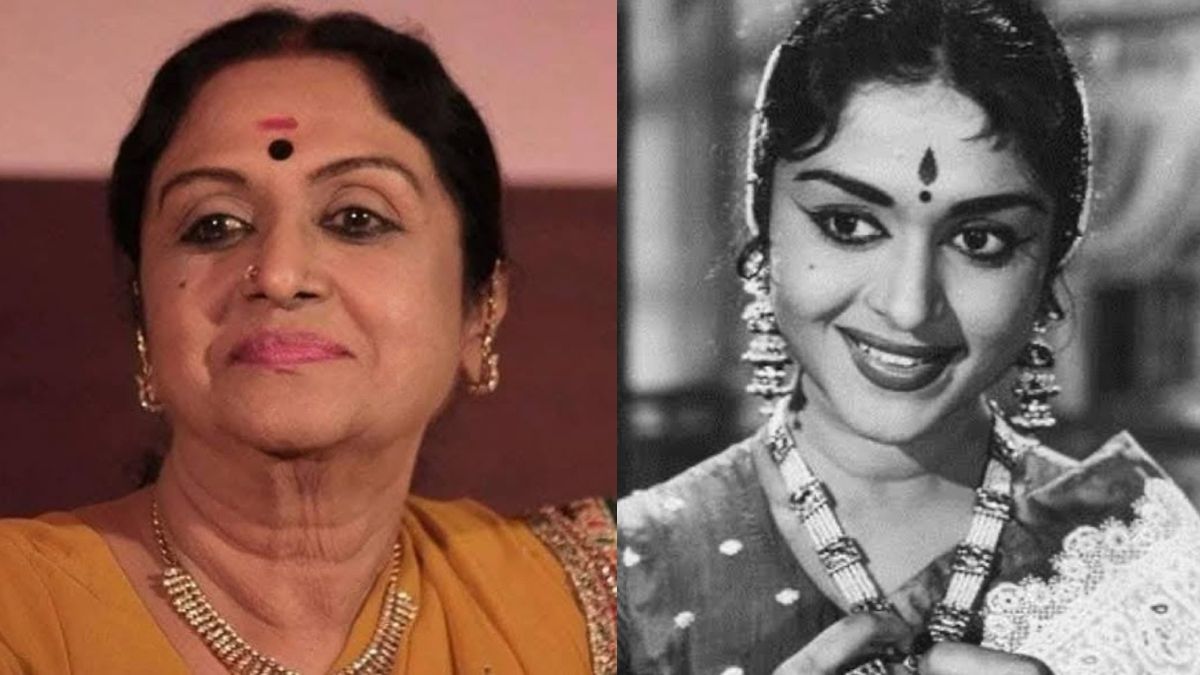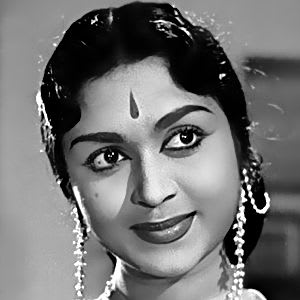The world of Indian cinema is in mourning following the passing of B. Saroja Devi, the iconic actress whose luminous career spanned over seven decades. She died at the age of 87 at her Bengaluru residence after a prolonged illness, leaving behind a legacy that is both monumental and deeply personal to millions of fans. Her journey, marked by resilience, grace, and relentless dedication, not only redefined the contours of Kannada cinema but also left an indelible imprint across South Indian and Hindi film industries. As tributes pour in from across the country, it is clear that B. Saroja Devi’s influence will endure for generations.
B. Saroja Devi’s contribution to Kannada cinema cannot be overstated. At a time when the industry was still finding its feet, she brought a level of professionalism and artistry that helped elevate Kannada films to national prominence. Her performances were characterized by a natural ease and emotional depth that made her characters relatable and memorable. She was often cast in roles that required a blend of strength and vulnerability, and she mastered this balance with remarkable skill. Her work helped pave the way for Kannada cinema to be taken seriously alongside the more dominant Tamil and Telugu film industries, and she remains one of the most celebrated actresses in Karnataka’s cinematic history.
Her work ethic was legendary among her peers. Despite her superstar status, Saroja Devi was known for her punctuality, dedication, and humility on set. Directors and co-stars frequently praised her for her willingness to rehearse extensively and her openness to direction, qualities that earned her respect and admiration. She was also known to be a supportive colleague, often mentoring younger actresses and helping newcomers navigate the challenges of the film industry. This generosity of spirit contributed to a collaborative atmosphere on many film sets and helped foster a culture of professionalism in South Indian cinema.
Saroja Devi’s ability to adapt to changing cinematic trends was another hallmark of her career. As Indian cinema evolved through the decades—from the mythological and historical epics of the 1950s and 60s to the socially conscious films of the 70s and the commercial blockbusters of later years—she reinvented herself to stay relevant. Whether playing a traditional heroine, a modern woman, or a maternal figure, she brought authenticity and nuance to every role. This adaptability not only extended her career but also allowed her to connect with audiences across generations, making her a beloved figure for viewers young and old.
Her collaborations with legendary actors created some of the most iconic moments in Indian cinema. The on-screen chemistry she shared with Dr. Rajkumar in Kannada films is still celebrated today, with classics like Kasturi Nivasa and Bhakta Kanakadasa being studied for their emotional resonance and narrative strength. In Tamil cinema, her pairing with M.G. Ramachandran and Sivaji Ganesan produced memorable hits that are considered milestones in the industry. These partnerships were built on mutual respect and professionalism, and they contributed significantly to the success and popularity of the films they worked on together.

The Early Years: Humble Beginnings to Meteoric Rise
Born on January 7, 1938, in Bangalore, B. Saroja Devi was raised in a modest family. Her father, Bhadravathi, worked in the police department, and her mother, Rudramma, was a homemaker who recognized her daughter’s artistic potential early on. Encouraged to pursue dance and music, Saroja Devi’s talents soon caught the attention of filmmakers. At just 17, she made her debut in the Kannada film Mahakavi Kalidasa (1955), a performance that immediately established her as a promising new face in the industry. Her expressive eyes, graceful movements, and natural flair for emotive roles quickly set her apart from her contemporaries, and she was soon cast in leading roles in both Kannada and Tamil films.
Stardom Across Languages: The Pan-Indian Phenomenon
Saroja Devi’s rise was nothing short of phenomenal. By the late 1950s and 1960s, she had become a household name not only in Karnataka but also in Tamil Nadu, Andhra Pradesh, and beyond. Her versatility allowed her to seamlessly transition between Kannada, Tamil, Telugu, and Hindi films, often working on multiple projects simultaneously.
She starred in landmark films such as Kittur Chennamma, Bhakta Kanakadasa, and Kasturi Nivasa in Kannada, while her roles in Tamil hits like Nadodi Mannan and Telugu classics like Panduranga Mahatyam solidified her reputation as one of Indian cinema’s first truly pan-Indian actresses. Her on-screen chemistry with legendary actors like Dr. Rajkumar, M.G. Ramachandran, Sivaji Ganesan, and N.T. Rama Rao became the stuff of cinematic legend, drawing audiences in droves and setting new box office records.
Breaking Barriers: Redefining the Role of Women in Cinema
At a time when the careers of most actresses were considered short-lived, often ending with marriage, B. Saroja Devi broke the mold. She married Sri Harsha, an engineer, in 1967 but continued to act in leading roles—a rarity in those days. Her husband’s unwavering support and her own determination allowed her to defy societal expectations and remain at the top of her profession for decades. Saroja Devi’s characters were often strong, independent women who navigated complex social realities, inspiring countless viewers and paving the way for future generations of actresses. Her ability to portray both traditional and modern roles with equal conviction made her a role model for women across India.
Awards, Honors, and Unmatched Recognition
Throughout her illustrious career, B. Saroja Devi received numerous accolades that testified to her extraordinary talent and contribution to Indian cinema. She was honored with the Padma Shri in 1969 and the Padma Bhushan in 1992, two of India’s highest civilian awards. The Karnataka government conferred upon her the Dr. Rajkumar Lifetime Achievement Award, and she received the Kalaimamani Award from Tamil Nadu. In addition to these, she was the recipient of several state and national film awards, and an honorary doctorate from Bangalore University. These honors reflected not just her artistic achievements but also her status as a cultural ambassador who bridged linguistic and regional divides through her work.
The Humanitarian: Beyond the Silver Screen
Saroja Devi’s legacy extends far beyond her filmography. Known for her philanthropic spirit, she was actively involved in various charitable initiatives, supporting causes related to education, healthcare, and women’s empowerment. She was instrumental in setting up scholarships for underprivileged students and contributed generously to disaster relief efforts. Her humility and compassion endeared her to colleagues and fans alike, and she often spoke about the importance of giving back to society. Even in her later years, she remained a guiding force in the industry, mentoring young actors and participating in film festivals and cultural events.
A Lasting Legacy: Influence on Modern Cinema
The influence of B. Saroja Devi on Indian cinema is profound and enduring. Her pioneering work in the 1950s and 1960s helped shape the narrative style and aesthetic sensibilities of South Indian films. Filmmakers and actors continue to draw inspiration from her performances, and many cite her as a key influence in their artistic journeys. Her films are regularly screened at retrospectives and film festivals, and her iconic roles are studied by students of cinema. The fact that she remained relevant for over seven decades, adapting to changing trends and audience preferences, speaks volumes about her talent and work ethic.

Tributes and Farewell: A Nation Remembers
The news of B. Saroja Devi’s passing has elicited an overwhelming response from the film fraternity, political leaders, and fans. Karnataka Chief Minister and other dignitaries visited her home to pay their respects, while social media platforms were flooded with messages celebrating her life and achievements. Leading actors and directors from across the country shared personal anecdotes, recalling her kindness, professionalism, and the joy she brought to every set. Her funeral in Bengaluru was attended by thousands, a testament to the deep bond she shared with her audience. As the nation bids farewell to one of its brightest stars, there is a collective sense of gratitude for the joy, inspiration, and cultural richness she brought into countless lives.
Conclusion
B. Saroja Devi’s life is a story of talent, perseverance, and grace. Her journey from a young girl in Bangalore to the reigning queen of South Indian cinema is a testament to her extraordinary abilities and indomitable spirit. She broke barriers, redefined the role of women in Indian films, and set new standards of excellence that continue to inspire. Her legacy is not just in the films she made but in the lives she touched, the barriers she broke, and the path she paved for future generations. As the curtains fall on an era, Indian cinema stands united in mourning and celebration of a legend whose light will never fade.
Beyond her cinematic achievements, Saroja Devi was a trailblazer for women in the Indian film industry. At a time when actresses were often relegated to ornamental roles, she demanded and delivered performances that showcased the complexity and strength of female characters. Her success challenged prevailing stereotypes and opened doors for more substantive roles for women. She also balanced her career with family life, demonstrating that women could pursue professional ambitions without sacrificing personal commitments. This dual role as a successful actress and a devoted family member made her an inspirational figure for many women in India.
Her philanthropic endeavors reflected a deep commitment to social causes. Saroja Devi was actively involved in supporting education for underprivileged children and was a patron of several charitable organizations. She believed in using her fame and resources to make a positive difference in society. Over the years, she contributed to healthcare initiatives and women’s empowerment programs, often working quietly behind the scenes to avoid the limelight. Her humility and dedication to service earned her respect beyond the film industry, and she was often invited to speak at events promoting social welfare.

The cultural impact of B. Saroja Devi’s films is evident in how frequently they are revisited and celebrated. Many of her movies are considered classics and continue to be broadcast on television and digital platforms, introducing her work to new audiences. Film scholars and critics often cite her performances as examples of exemplary acting in Indian cinema. Retrospectives and film festivals dedicated to her career have been held, highlighting her contributions and preserving her legacy. This ongoing appreciation underscores the timeless quality of her artistry and the deep connection she forged with viewers.
Follow: Saroja Devi
Also Read: Tragedy at Southend: 4 Lives Lost in Fiery Airport Crash—A Nation in Shock

